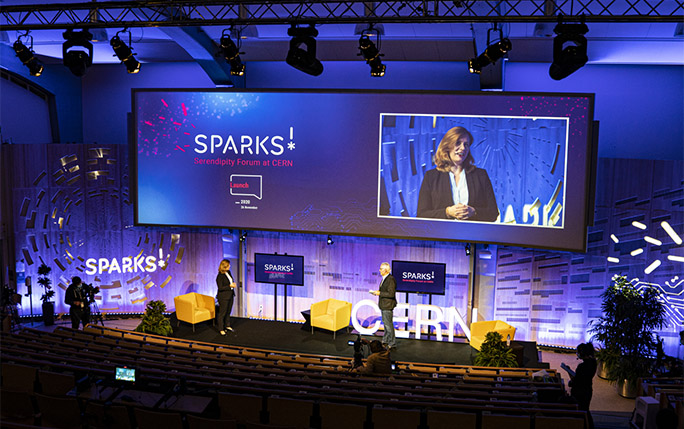CERN launches new and multidisciplinary science innovation forum ‘Sparks!’

Last week, a new and multidisciplinary science innovation forum and public event called Sparks! Serendipity forum at CERN was launched via a virtual conference.
Via this forum, CERN will bring together renowned scientists from diverse fields around the world, along with decision makers, representatives of industry, philanthropists, ethicists and the public to bring a novel, multi-faceted approach to addressing some of the big questions of our time. The goal is to foster a new community and develop a platform to spark innovation in issues related to science, technology, engineering and mathematics that are relevant to society, necessary for CERN, and that further CERN’s mission of science for peace.
At the launch event, scientists talked about the current status of the field of AI research and how CERN and other big science can benefit of AI, setting the scene for the discussion about the future of this field during the event in 2021. Sparks! will begin with a cycle of three pilot events between 2021-2023, each focusing on a single theme.
The first edition is focussed on Future Intelligence and kicks-off with a podcast series in January 2021 with the Forum to take place at CERN, Meyrin (CH), on 17-18 September 2021. On the last day of this Forum, a public event at HEAD, Geneva (CH) closes the 2021 Edition.
CERN is the world’s largest particle physics laboratory which acts as a focal point for European physics and technology collaborations. It has a very strong track record as a European training centre and it has great experience in tutoring and mentoring of early stage researchers as well as in the transmission of complementary kills. CERN has been an AVA Partner since the launch of the AVA Network in 2017.
Research physicist at CERN and AVA Steering Committee member Dr Michael Doser, who also sits on Advisory Board for Sparks!, said: “Machine learning, neural networks, but also other forms of artificial intelligence are playing an increasing role both in extracting subtle results from experiments in fundamental research as in detecting anomalies and dealing with them. The first Sparks forum will take a step from these present applications and will focus on future challenges: recognizing (and learning to ignore) repetitive situations, implementing artificial curiosity and perhaps even creativity, and exploring how future AI technologies and approaches can help science address ever more complex questions”
Further details, including information about the first edition and its podcast series, can be found here: https://sparks.cern. This website also provides the possibility to re-watch the virtual launch event that took place on 26 November 2020.